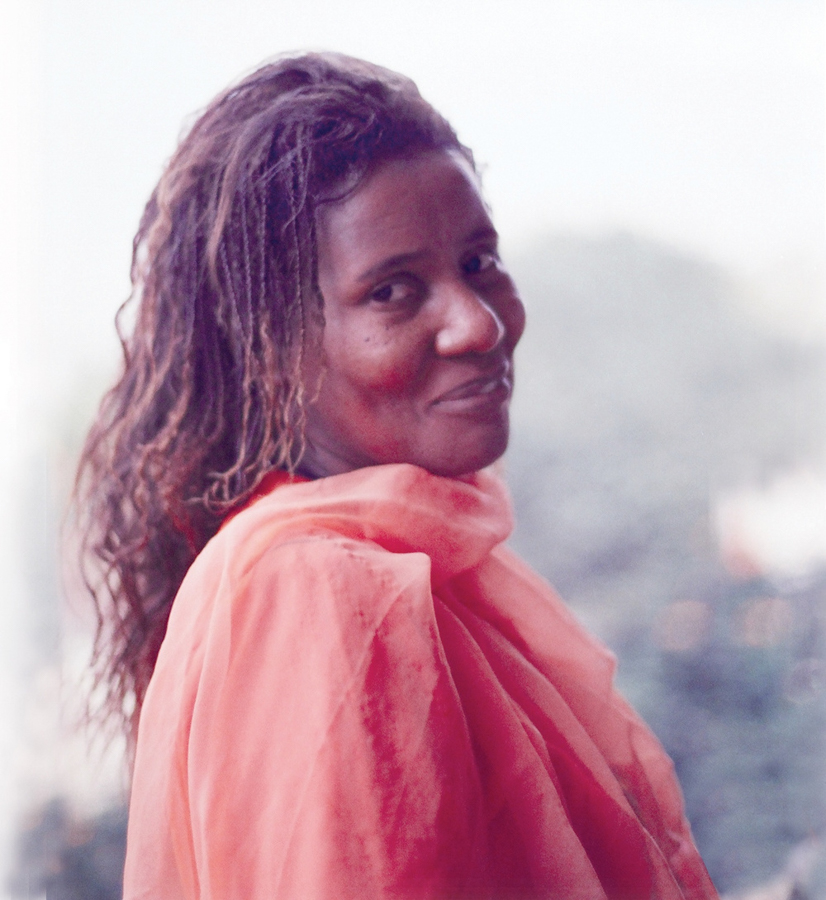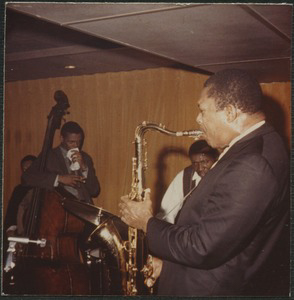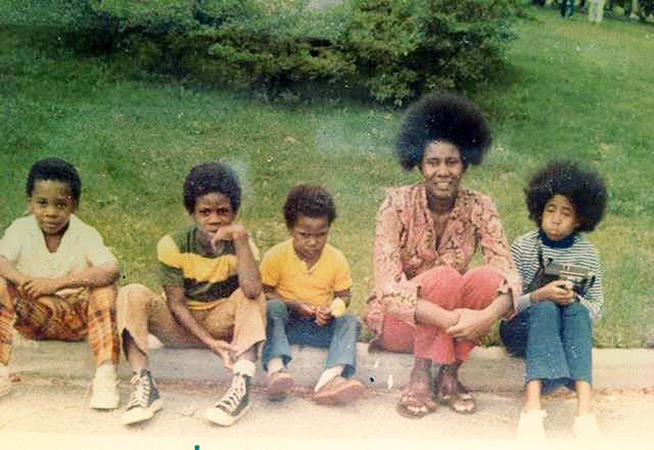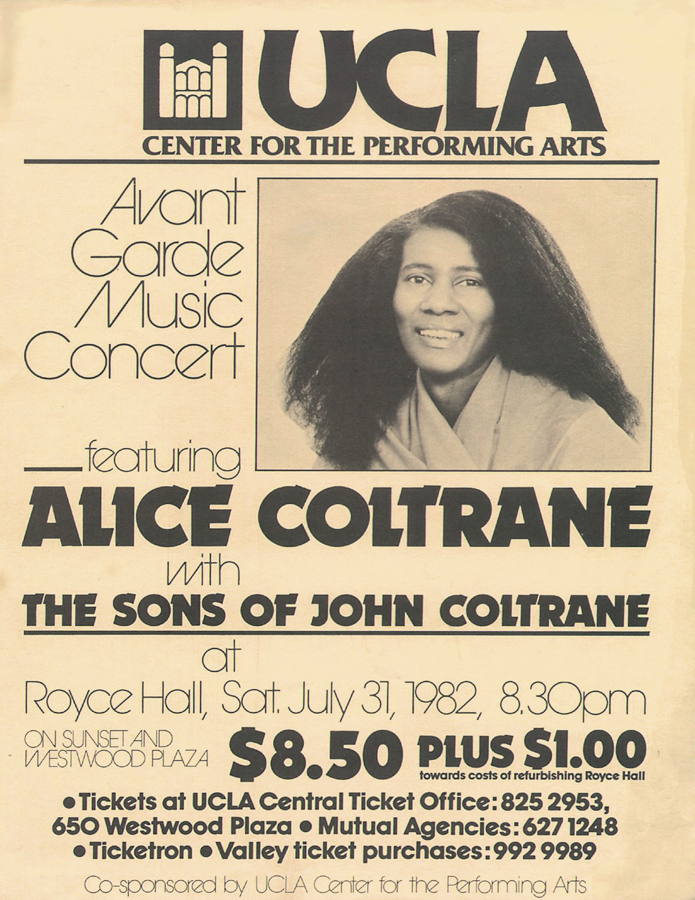Alice Coltrane, Jazz Spiritualism
Oral History of Jazz Harpist and Pianist from the U of I Leonard Feather Collection
Contents: Early Career | Spirituality | Interview with Leonard Feather | About the Collection | About the Fellow | Tech
Early Career
Born in 1937, Alice grew up in Detroit, Michigan to a very large family of six children and took on music early in her childhood, but it wasn’t until the early ‘60s when she began to play in the jazz field professionally. Alice played with her own trio and worked with many other notable artists while she lived in Detroit, which is how she happened to meet her husband, John Coltrane. Alice would replace McCoy Tyner in the John Coltrane Quartet in 1966 and continued to perform with them until John’s untimely death only about a year later.
Spirituality
Alice Coltrane had already been a large proponent of religion and its influence in music, and it seemed that John’s death only amplified these ideas for her when she decided to become a solo recording artist. She spent much of her time in isolation - praying, fasting, meditating - to seek a spiritual truth. It was during this time that Alice met her guru, traveled to India, and dedicated herself to God.
Alice and her children - Michelle, John Jr., Ravi, and Oranyan - moved from their home of New York to Los Angeles and Alice opened her own spiritual retreat called The Vedantic Center in 1975 until it was relocated to the Santa Monica Mountains of Agoura, California. Alice recorded 25 albums, several of which featured spiritual music that Alice had composed herself and she wrote many books on the subject of her religion.
Interview with Leonard Feather
In 1981, Leonard Feather traveled to the home of Alice Coltrane in LA where they discussed several topics , of course focused on, but not limited to her music. Feather was a widely known music journalist that interviewed dozens of musicians throughout his lifetime, largely in part due to his Blindfold Test recordings. In these recordings, Leonard Feather would ask a musician to blindfold themselves, much as the name implies, and listen to an unknown recording of a jazz tune, after which they would discuss their thoughts on the playing and arranging of the piece. The interview with Alice Coltrane would be much more than his standard blindfold tests. Feather was a fan of Alice’s work and had previously written the liner notes for one of her albums Ptah, the El Daoud, which was released in 1970, as well as writing about her music prior.
Alice Coltrane spoke extensively in the interview with Feather about her spirituality and its impact on her musical career and her family life. Much of what she did every day to connect with a greater purpose, she encouraged her children to join her in doing as well, such as daily meditation and reading of the Hindu scriptures. She also talked to Leonard Feather about how she was able to connect with her late-husband, John Coltrane, through her meditation.
This interview was recorded while Alice and her sons were preparing for a concert at UCLA where they were to perform a set of her own music, which was referred to on the poster as avant garde. Sadly, this would be one of the last times John Jr. would be recorded, because on August 9th, 1982, John Jr. would die at the age of 17 in a car accident. This would have a profound impact on the family, leading Alice further into her spiritual studies and music and particularly the middle son, Ravi, who would quit music entirely.
Leonard Feather had recorded one of the few, if not only, interviews existing with Alice Coltrane and all three of her sons, giving the listener a unique perspective on their family dynamic after their father’s death, touching on topics of school, music, religion, and much more.
About the Collection
Among the vast works in the University of Idaho’s International Jazz Collection archives, many items belonged to the late Leonard Feather (1914-1994) made up of letters, manuscripts, interview tapes, music scores, books, vinyl records, CDs and other memorabilia. Items were generously donated by Feather’s family in 1995 to the Lionel Hampton School of Music and have since been housed in the university’s special collections. A large portion of the collection has been digitized and made available through the University of Idaho Library Special Collections website, but there are still many items that exist only in their physical locations.
About the Fellow
Irene Koreski is a professional conductor, flutist, and vocalist currently studying at the University of Idaho. While attending University of Idaho, Irene has performed with the wind ensemble at the All-Northwest Conference in 2023 and as a vocal soloist for the chamber jazz choir. She recently performed the role of ‘Ida’ in her university’s spring 2024 production of Die Fledermaus and has previously taken classical voice lessons with Lynette Pfund. Irene is currently serving in her second term as president of the Sigma Alpha Iota women’s music fraternity on campus and is in her third term as secretary. Irene also teaches several flute and voice students through the University of Idaho preparatory division.
Irene has been conducting for the past six years at the performance level, first with her high school marching band and then as a drum major for the Columbians Drum and Bugle Corps based in Pasco, Washington. She hopes to continue her growth in the conducting and education field while gaining experience through leading local ensembles. Irene enjoys all aspects of music, but her favorite areas of focus are music theory, vocal jazz repertoire, flute music from the romantic period, and music by female composers. When Irene is not in the practice room, she enjoys listening to jazz charts and reading one of the many books in her collection.
Technical Credits - CollectionBuilder
This digital collection is built with CollectionBuilder, an open source framework for creating digital collection and exhibit websites that is developed by faculty librarians at the University of Idaho Library following the Lib-Static methodology.
Using the CollectionBuilder-CSV template and the static website generator Jekyll, this project creates an engaging interface to explore driven by metadata.




